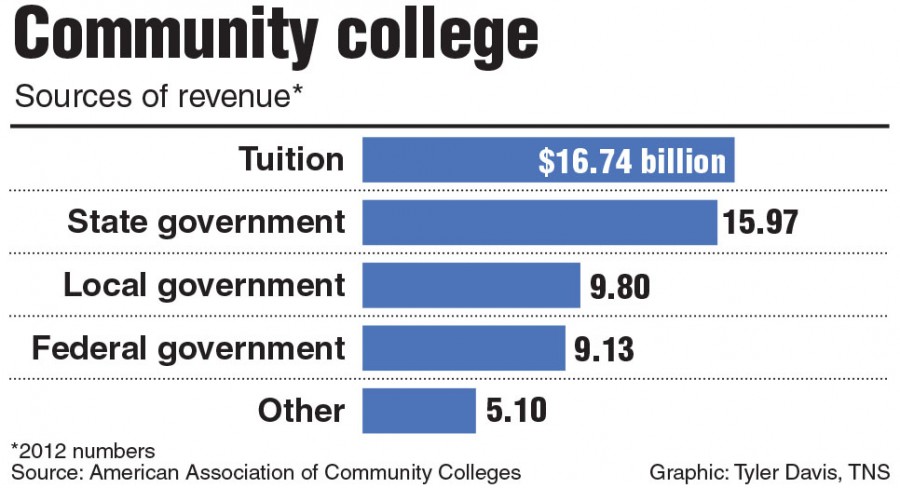Community college should not be free
courtesy of Tyler Davis, TNS/ MCT Campus
Sources of revenue for community colleges. Tribune News Service 2015.
April 24, 2015
Lancer Media would like to know what you think about the White House proposal to make the first two years of community college free? Take our poll now.
One Student’s View:
On January 8th, 2015, President Barack Obama proposed a policy that the first two years of community college would be free for students who have a GPA of 2.5 or higher. The reasoning behind this is that in the growing US economy people need to have more skills and knowledge, and even those who cannot afford to go to college should be able to attend. In my opinion, this proposal, while it sounds great, will cause a decline in the quality of college instruction and facilities, increase debt and/or taxes, reduce the power of the states, and the program is statistically unnecessary.
If the first two years of community college are free, then the quality of all colleges will decline. This is because 4 year universities and colleges will not be able to compete with free college, so they won’t get enough enrollment and tuition money for the upkeep of their schools. Also, since the community colleges would have decreased competition , then the leadership of community colleges won’t spend money to make the schools better. Adam Smith, who is often considered the father of economics, stated in his book, “The Wealth Of Nations,” “It is not from the benevolence of the butcher, the brewer, or the baker, that we can expect our dinner, but from their regard to their own interest.” This means that the leadership of these colleges will not make their college better just because it is the nice thing to do; if it won’t benefit them they won’t do it.
Another effect of the first two years of community college being free is an increase in the national spending. According to the White House budget office, if this proposal takes effect in all 50 states, it will save a student an estimated $3,800 per year and could affect an estimated 9,000,000 students each year, meaning that, according to my calculations, the government will be spending an extra $34.2 billion each year. When asked how the government would pay for this endeavor, the White House Advisers did not provide the information. If the federal government does pay for Community College, it will skew the colleges’ main source of revenue (see graph).
One important thing about community colleges is that they are regulated by the state, not by the national government. If the national government wants to, they can make this proposal mandatory by bribing the states through decreasing funding. This supports the argument that the national government is becoming too powerful. According to recent Gallup studies 60% of Americans believe the government has too much power. That number will only increase if this proposal takes effect.
Making the first two years of community college free is statistically unnecessary. David Hudson, author of “The President Proposes to Make Community College Free for Responsible Students for 2 Years” said, “In our growing global economy, Americans need to have more knowledge and more skills to compete — by 2020, an estimated 35 percent of job openings will require at least a bachelor’s degree, and 30 percent will require some college or an associate’s degree.” This seems to be a reasonable cause to make the colleges free, until citizens consider that most high school graduates are going to college. According to the Bureau of Labor Statistics, in October 2013, 65.9% of high school graduates were enrolled in colleges, which is enough to sustain the need for education.
Finally, I believe that everyone does not need to go to college to pursue a career, and making the first two years of community college free may drive people to enroll who shouldn’t. According to the Bureau of Labor Statistics, of the high school graduates who enrolled in college, 34.1% of them were either working or looking for work. Of those graduates that weren’t enrolled 74.2% of them were either working or looking for work. This means that if young people want to work in something that doesn’t involve college experience and they go to college, they are likely to miss years that they could be working.



